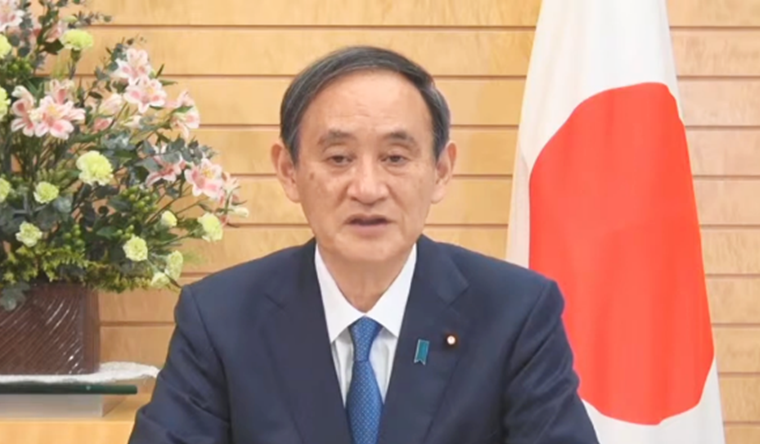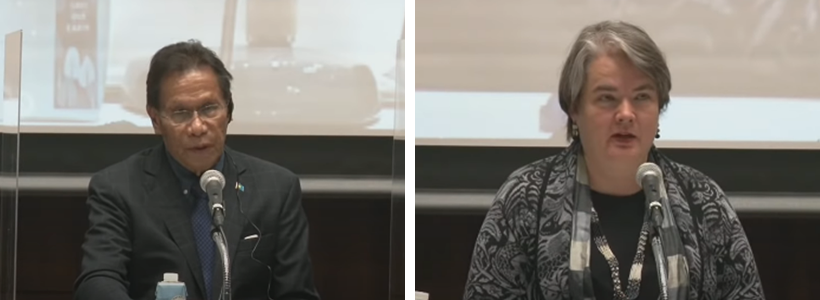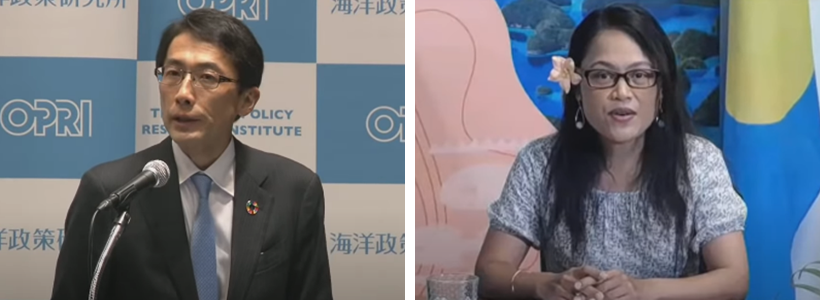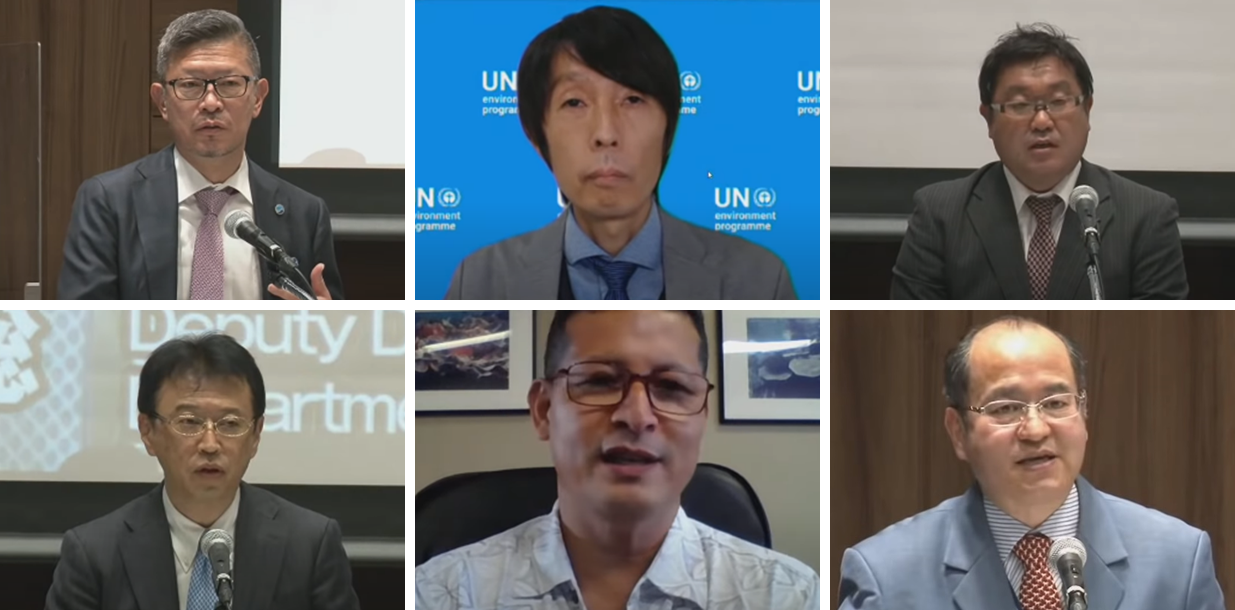News
International Webinar “Ocean Panel’s policy recommendations: Promoting sustainable ocean economies and international partnership” Outcome Report — Detailed Version

H.E. Mr. Yoshihide Suga, Prime Minister of Japan
High Level Session
Dr. Sunami is grateful that the International Webinar is organized to discuss the policy recommendations of the High Level Panel for a Sustainable Ocean Economy as an online event during the 3rd wave of the global pandemic of COVID-19. The Blue Recovery webinar series with The Economist was held in the summer of this year, where prominent speakers discussed vital issues such as the ocean and climate change nexus, marine environment protection and marine ecosystem conservation, innovation and ocean technology in order to ensure the sustainability of the ocean and marine resources. The blue economy is an important policy objective and the Ocean Panel, which consists of 14 heads of states and governments of countries, has promoted international collaboration to formulate policy recommendations for a sustainable ocean and blue economy from holistic viewpoints. The Ministry of Foreign Affairs, Japan, OPRI-SPF, and JAMSTEC (Japan Agency for Marine-Earth Science and Technology) support the work of the Ocean Panel. Dr. Sunami is pleased to have the collaboration of the Palauan Embassy and Norwegian Embassy in Tokyo in organizing this webinar. As a series of webinars will take place today from Australia and Fiji onwards to Africa, Europe and North and Latin America, Dr. Sunami hopes the important policy recommendations from the Ocean Panel will be shared with a wide range of stakeholders and bolster partnerships to ensure that our ocean will be sustainable and conducive to promoting a sustainable ocean economy for the present and future generations.
Prime Minister Suga pays tribute to H.E. Ms. Erna Solberg, Prime Minister of Norway, and H.E. Mr. Tommy Remengesau, Jr., President of the Republic of Palau for their leadership in spearheading high level discussions for sustainable ocean development and conservation. It is Japan’s indispensable responsibility to pass on our ocean and marine resources in a sustainable manner to future generations. For a sustainable ocean economy, it is important to take ambitious actions toward mitigating climate change through, for instance, leveraging ocean-based renewable energy. Japan is committed to sustainably managing the ocean under its jurisdiction so as to ensure that future generations can reap benefits from the abundant ocean resources. Japan will aim to reduce greenhouse gas emissions to net-zero by 2050 and realize a carbon-neutral society. Japan launched the “Osaka Blue Ocean Vision” at the G20 Osaka Summit last year. The Vision aims to reduce additional pollution by marine plastic litter to zero by 2050. Japan will actively tackle this problem with relevant partner organizations such as the United Nations Environment Programme’s International Environmental Technology Centre (UNEP-IETC), located in Osaka and is expected to facilitate technical assistance to developing countries.
President Remengesau is thankful to Prime Minister Suga for his support and endorsement of the High Level Panel’s work and hopes to continue the engagement of former Prime Minister Shinzo Abe in ocean and Pacific island issues. President Remengeau is encouraged by the announcement that Prime Minister Suga made shortly after he took office regarding Japan’s net zero target for greenhouse gas emissions. His announcement is very important to underline climate goals and highly relevant to the Panel’s ocean agenda. The net zero emission policy is widely shared by the international community and exemplifies Japan’s world-wide partnerships. The health of our oceans depends on keeping the Paris Agreement’s temperature goal alive to avoid the worst impacts of ocean warming, sea level rise, extreme weather events and acidifying waters. Our ocean agenda also needs to reflect the crisis of the pandemic that we have faced this year. Thus, the Ocean Panel released the policy recommendations called, “Transformation for Sustainable Ocean Economy, a vision for protection, production and prosperity” that addresses new and established ocean industries, effective ocean protection, expanding ocean knowledge, and the financing of such a transformation. Plans for sustainable ocean economies will make the ocean healthier and create opportunities for us to respond to the pandemic with a build-back-blue and build-back -better approach. President Remengesau regards the partnership with Japan as important in improving the effectiveness of actions on sanctuaries, culture, tourism, and waste management. They are to promote a sustainable ocean economy and to pass a sustainable ocean to our children by having a sustainable ocean economy in tandem with marine protection.
Japan and Norway share the same ocean despite the physical distance and the two countries depend upon the ocean for our food, prosperity, and health, which are vital for the future of our coastal communities. Prime Minister Solberg praises Prime Minister Suga for joining the Ocean Panel and continuing Japan’s involvement in this very important undertaking that is supported by more than 230 world leading experts who have provided new science, knowledge and opportunities for actions. The 14 Ocean Panel leaders have committed to sustainably manage 100 percent of our ocean and call on other world leaders and partners across the private sector, civil society and others to join the leaders in making the 100 percent goal of ocean management a reality.

H.E. Mr. Tommy Remengesau, Jr. President, Republic of Palau (center) /
H.E. Ms. Erna Solberg, Prime Minister, Norway (right).
Ambassador Matsutaro is grateful about the partnership between Palau and Japan that have grown over the past years in the areas of achieving a sustainable ocean and promoting the conversation and sustainable use of marine, particularly fishery, resources. Ambassador Matsutaro is hopeful that OPRI will continue to support its partnership with Palau for achieving a sustainable ocean and promoting a sustainable blue economy, the recovery to overcome COVID-19 challenges, and for the benefit of Pacific island countries and the international community.
Ambassador Nyhamar looks forward to continuing the long-standing multifaceted cooperation between Norway and Japan. The development of green shipping is an important aspect of mutual cooperation. Other aspects include improved ocean management, ocean wind power and mutual partnership in assisting developing countries towards achieving ocean sustainability.

H.E. Mr. Francis Matsutaro, Ambassador, Republic of Palau to Japan (left) / H.E. Ms. Inga M. W. Nyhamar, Ambassador of Norway to Japan (right)
The Ocean Panel’s policy recommendations that were released a day earlier. The targets of the policy goals are set for 2030. One of the policy recommendations addresses renewable energy. Offshore wind power can achieve impacts in the three dimensions of climate change mitigation, economic promotion, and improving energy security. Marine pollution control is another important policy goal, particularly the elimination of marine plastic litter. In order to realize the Osaka Blue Ocean Vision’s target of making additional pollution by ocean plastic litter zero by 2050, Japan is going to support infrastructure and human resources development for better waste management and lead international discussions on the elimination of marine plastic litter. The Ocean Panel’s policy recommendations must serve as a policy instrument to establish a sustainable ocean economy.
H.E. Ms. Ngedikes Olai Uludong, Ambassador and Permanent Representative of the Republic of Palau to the UN in New York
Despite difficult work conditions in 2020, it is great to see the policy recommendations conclude with a new and ambitious ocean agenda. It is a great pleasure for Amb. Olai to take part in developing the policy recommendations. The policy recommendations set out 74 actions that have been informed by science and which we need to achieve through deeper cooperation and forging new partnerships. As the pandemic persists, there is a great need for support in finance and implementation of the policy recommendations in small island states like Palau. Thus, the policy recommendations spotlight the need for more coherent ocean finance that incentivizes sustainability and recognizes the unique circumstances of small island states. The advantage of a sustainable ocean plan is its flexibility in accommodating national circumstances. We need to put 100 percent effort into this. All the ocean is connected. We need to include all ocean users in developing a sustainable ocean plan so that we can improve and achieve equitable prosperity. We need to give the ocean 100 percent of our efforts because 100 percent of us depend on the ocean.

H.E. Ms. Ngedikes Olai Uludong, Ambassador and Permanent Representative of the Republic of Palau to the UN in New York (right)
Panel discussions
With the support of the Japanese Ministry of Education, Science, Technology and Sport (MEXT), JAMSTEC collaborates with Norwegian partners in discussing the operation of ice breaking vessels. Dr. Sakaguchi participates in the Ocean Panel’s Expert Group and supported discussions on knowledge, health and equity. It is vital to take data and acquire evidence. It is also vital to maintain independence and broad partnership and consistently take forward steps. This may not be always easy for the government or the private sector. NGOs play a lubricant role by connecting different stakeholders. At the Japan-Palau friendship yacht race held in December last year, JAMSTEC conducted a monitoring survey of marine microplastics during the sailing from Yokohama to Koror. The result of the survey revealed that a comparatively higher density of microplastic was found in Japanese territorial waters and EEZ while far less microplastic was in Palau’s waters. It was projected to be close to be nil in the Palau’s EEZ, but it was surprising that the microplastic density in the Palau’s EEZ was larger than originally anticipated. Palau’s EEZ is designated as a marine protected area. As JAMSTEC is affiliated with MEXT and its budget is determined a year in advance, JAMSTEC is not usually able to respond to plans like this yacht race, but it was made possible for JAMSTEC to join the race this time with the support of NGOs. It is indispensable that the government, NGOs, and the private sector collaborate in facilitating the implementation of the Ocean Panel’s policy recommendations.
OPRI is a member of the Advisory Network that has 131 members including private companies, NGOs, and international organizations, and supports the Ocean Panel. One of the three Co-chairs is Dr. Naoko Ishii, former GEF/CEO. The Advisory Network is intended to mobilize and aggregate expertise from various sectors, promote expert/stakeholder dialogues, support the production of reports (16 blue papers and 3 special reports), disseminate information, and advance actions for transformation. The Advisory Network also supports the establishment of “Action Coalitions” to share information and promote transformative actions. The Advisory Network aims at amplifying messages, committing to implement measures and actions, transforming interactions with the ocean and leading change. The operational directions of the Advisory Network are to rely on scientific data, integrate transformation in ocean planning, promote innovation, reduce GHGs emissions, protect marine and coastal ecosystems, promote a circular economy, and foster ocean accounting. The challenges of the Advisory Network are to promote cross-sectoral partnerships, undertake monitoring and measure impacts, identify replicable commonalities, articulate local peculiarities, promote co-benefits/synergies, and optimize trade-offs.
“Our planet is broken and oceans are choking with plastic waste, but a circular economy is reducing waste” according to UN Secretary-General António Guterres. Waste is an environmental issue that is the most proximate to our life. UNEP-IETC aims at a circular society and supports waste management. Without a transition to a circular society, it would be difficult to achieve SDGs and decarbonize our society. UNEP-IETC carries out projects for a wide-range of issues including plastic waste management, waste and climate change, and waste management amidst the COVID-19 pandemic. Proper waste management will reduce marine plastic. UNEP-IETC launched the UNEP Sustainability Action. This is promoted with Fast Retailing, Seven and i Holdings, Earth Mall with Rakuten to pursue sustainability. We must not forget to make our earth environment sustainable and protect our ocean, which is the source of life on our planet. When we know the excellence of nature and that we are part of nature, we will take spontaneous actions to protect our nature. This is a critical aspect even in international cooperation.
The priority task of the mid-term sustainability management plan of Maruha Nichiro is the conservation of marine resources. The management plan includes the strengthening of measures to eliminate IUU fishing, promotion of the acquisition of fisheries and aquaculture sustainability, and enhancement of the certification of seafood traceability. A fishery resource survey was initiated in fiscal year 2020. In order to practice sustainable procurement, a survey is also being launched to comprehend the current status of seafood management, including products and ingredients throughout the group companies and supply chains. Maruha Nichiro joined SeaBos, an international coalition to tackle IUU fishing, forced labor, child labor, climate change, marine plastic and traceability. The Maruha Nichiro group intends to eliminate IUU fishing and slavery labor by October 2021 and lays out the objective of becoming capable of acting swiftly whenever there is any problem in the Maruha Nichiro group companies and beyond their supply chains by October 2025.
JERA is a joint venture of the Tokyo Electric Power Company and Chubu Electric Power Company of about 4,000 employees, which generates about one-third of Japan's electricity. The first initiative at JERA is the "Zero-Emi 2050" initiative, which presents a roadmap for achieving zero emissions by 2050. The second initiative is the "Door-to-Door" initiative, which considers the entire lifecycle of power generation from the construction of power generation facilities to their demolition in a single timeline and assesses the impact of such operations on the environment and society. JERA considers the environmental impact and costs throughout the entire business chain. For example, in the case of offshore wind power, it requires capital investment in not only offshore wind turbines, but also onshore transmission lines and other facilities. The third initiative is the establishment of an international industry association called OPREAC which aims to develop 1,400 gigawatts of power generation and supply by 2050. 1,400 gigawatts are equivalent to 10 percent of the world's electricity use.
In Palau, efforts are being made to achieve the recommendations of the Ocean Panel, namely proper management of 100 percent of the ocean area. The Protected Area Network (PAN), established in 2003, is a mechanism for managing the coastal ecosystems that are important to Palau by incorporating traditional management practices in the PAN implementation. The export of resources from coral reefs is also prohibited. In addition, with regard to offshore ecosystems, the Palau National Marine Sanctuary (PNMS) was established in 2015 and 80 percent of Palau’s EEZ was designated as a no-fishing zone. The Palau International Coral Reef Center supports the adaptive management of the PNMS through monitoring and research activities.

Dr. Shunichi Honda, Programme Officer, United Nations Environment Programme – International Environment Technology Center (upper center) /
Mr. Hiroyuki Sato, Manager, Sustainability Group, Corporate Planning Department, Maruha Nichiro Corporation (upper right) /
Mr. Satoshi Yajima, Deputy Director-General, Business Development Department, JERA Co., Inc. (lower left) /
Dr. Yimnang Golbuu, CEO, Palau International Coral Reef Center (lower center) /
Mr. Masanori Kobayashi, Senior Research Fellow, OPRI-SPF (lower right)
Discussions
The Federated States of Micronesia (FSM) designated 30 percent of its waters within its jurisdiction as protected areas in 2006, which will be expanded to 50 percent. The FSM also protects marine resources through the Blue Prosperity Micronesia Program. FSM regards ocean conservation and sustainable use as a policy priority and looks forward to furthering our partnership with OPRI, the Japanese government and other partners.
Marshall Islands is a large ocean state and not just a small island nation. The extended territory of Marshall Islands is over 2 million square kilometers and more than 99 percent of that territory is ocean, with some of the world’s richest marine biodiversity. With so much at stake, the health of our ocean is a clear national priority and the Marshall Islands welcome the launch of the Ocean Panel’s report as an opportunity to refocus political will on the global stage in achieving healthy oceans. The protection of fisheries resources such as tuna is very important, and measures to curtail IUU fishing have been implemented. There are many other issues such as sea level rise due to climate change and the impact of COVID-19 on the economy. Since the oceans have no boundaries, the Marshall Islands hope to solve these issues through international cooperation and collaboration.
Guam has developed an action plan for the sustainable conservation and use of marine resources. The University of Guam is also involved in the grant program, the "Ridge to Reef" project and research on renewable energy.
The University of Hawaii has a Sea Grant program and the East-West Center is co-located. They work together on capacity building and other aspects of the program to support Pacific islands and their ocean management.
The Monterey Aquarium welcomes and supports the recommendations of the Ocean Panel. The Monterey Aquarium is committed to sustainable seafood sourcing, including the Seafood Watch program and the promotion of sustainable aquaculture in countries such as Viet Nam.
In response to the recommendations of the Ocean Panel, the Friends of Ocean Action and its partners would like to promote international cooperation for promoting sustainable ocean economies.
Wrap-up and concluding session
Mr. Eiji Sakai, Vice President, OPRI-SPF expressed his gratitude to all panelists, participants, and the audience.
Note:
With respect to the question on the lifecycle and business chain cost analysis, Mr. Yajima provided a response after the webinar. The cost of offshore wind power generation include the cost of development (survey on seafloor and wind conditions, environmental impact assessment, preparatory work for construction), the cost for constructing wind turbine facilities (the cost is estimated to be JPY400 – 500 billions for 1 million kW facilities), the cost for constructing power transmission facilities), management and maintenance costs (e.g., 20 – 30 year operations, support to host local communities), and the cost for termination and removal. The lifecycle cost assessment is in general to divide the entire cost by kWh.
After the webinar, Mr. Sato provided a response to the question concerning the information disclosure policies of Maruha Nichiro. In fiscal year 2020, Maruha Nichiro started surveys on the volume of seafood and their sustainability as they relate to the products and ingredients that Maruha Nichiro group companies and their suppliers handle. Maruha Nichiro has also started compiling the information on the results of the surveys and will soon make public such information at its website: https://www.maruha-nichiro.com/sustainability/.